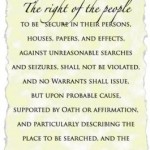 In an age of NSA surveillance, secret courts issuing secret warrants, IRS officials allowing private data to be made public and more, it is important to take notice when the Supreme Court steps up and unanimously limits government intrusions in line with the intent of the Founders.
In an age of NSA surveillance, secret courts issuing secret warrants, IRS officials allowing private data to be made public and more, it is important to take notice when the Supreme Court steps up and unanimously limits government intrusions in line with the intent of the Founders.
Applying 18th Century constitutional commands in the modern age is often a challenge for courts. The Fourth Amendment‘s requirement for a government agent to obtain a warrant before a search is often the most vexing. Among the questions developed over the last two decades: Is a warrant required to search the digital contents of a cell phone? On June 25, 2014, in a victory for the Founding Fathers’ concern over warrantless seizure of a citizen’s property, the Supreme Court unanimously said: YES, a warrant is required to search a cell phone’s contents.
 The Constitution’s Fourth Amendment
The Constitution’s Fourth Amendment
On its face, the United States Constitution’s Fourth Amendment of the Bill of Rights appears clear when it comes to requiring a government agent obtain a warrant before searching a citizen’s property:
“The right of the people to be secure in their persons, houses, papers, and effects, against unreasonable searches and seizures, shall not be violated; and no Warrants shall issue but upon probable cause, supported by Oath or affirmation, and particularly describing the place to be searched, and the persons or things to be seized.”
Warrant Requirement, Exceptions and the Exclusionary Rule
Over the nation’s history, the warrant requirement has become riddled with “exceptions”. These exceptions include among others: a search when a person is arrested, the automobile inventory search, “exigent” circumstances, officer “good faith” exception, and perhaps the one most difficult to understand the smell, knock and no answer search.[1]
Generally, if police seize a person’s property without a warrant, that property cannot be used as evidence to prosecute the owner whose Fourth Amendment rights were violated. The evidence is suppressed by the Exclusionary Rule. This is true, unless an exception to the warrant requirement applies. If there is a recognized exception the property and other evidence may be used for a criminal prosecution.
Exceptions to the warrant requirement have developed over the years in an effort to balance a citizen’s Fourth Amendment rights with society’s needs for effective law enforcement. One question in the digital age has been: Is the 21st century data kept in a person’s cell phone the equivalent of a person’s 18th century “papers and effects”?
In modern times, it is likely that someone arrested will have a cell phone in his possession. Regarding the “search incident to arrest” exception, police may search a person and the area in his immediate vicinity after a lawful arrest.[2] During the arrest, the police will probably legally come into control of the person’s cell phone. It had been an open question if the police can search the contents of the phone without a warrant.
Riley v. California and United States v. Wurie
In Riley v. California the Supreme Court combined two cases involving police searching cell phone content of an arrestee’s phone. In the first case, David Riley was stopped for expired automobile registration and arrested for driving with a revoked driver’s license. The police took custody of his phone and without getting a warrant went through the phone’s data. Based on pictures and other data on the phone, officers pursued further investigation into Mr. Riley. He was charged with attempted murder. At his trial, officers testified regarding the cell phone’s content and some pictures from the phone were used as evidence. In the end, Riley was sentenced to fifteen years in prison.
In the second case, Brima Wurie was arrested after a surveillance officer observed Wurie make an apparent drug sale from a car. During the arrest, the officer took possession of his phone, which began ringing. The caller ID indicated “my house”. The police searched the phone for the number, found the house, and obtained a warrant to search the house. They found drugs and firearms. Wurie was convicted of multiple offenses, and sentenced to 21+ years in prison.[3]
Both Riley and Wurie had argued that the evidence from the cell phones was obtained illegally without a warrant. The Supreme Court agreed and reversed their convictions.
 Supreme Court Makes the Leap from 18th Century to 21st
Supreme Court Makes the Leap from 18th Century to 21st
It is uncommon these days for the Supreme Court to agree unanimously on a subject.[4] It is more uncommon for them to all join an opinion that is built around the Founders’ original intent.
Chief Justice Roberts’ opinion[5] does a thorough job of discussing why the accepted exceptions[6] do not apply to cell phone data. He does an excellent review of how often years of a person’s life whether photos, emails, call records and texts are potentially in someone’s phone.
After that thorough review he provides the reasons the Fourth Amendment exists, tracing back to Attorney James Otis’ 1760 arguments[7] against the British “Writs of Assistance”. In reality, the contents of a cell phone are in fact a person’s paper and effects. The Chief Justice summed up this way:
“The fact that technology now allows an individual to carry such information in his hand does not make the information any less worthy of the protection for which the Founders fought. Our answer to the question of what police must do before searching a cell phone seized incident to an arrest is accordingly simple— get a warrant.”[8]
[1]The smell, knock, no answer exception is a name I created for a bizarre decision when police lost view of a suspected drug dealer and broke into someone else’s apartment.
[2]A “lawful arrest” has taken place when someone is either arrested pursuant to an arrest warrant, or a police officer has “probable cause” to believe a crime has been committed and the person arrested is the perpetrator.
[3]Neither Riley nor Wurie are sympathetic figures. The prison sentences of 15 and 21+ years reflect the nature of the criminal activity discovered from the illegal cell phone searches, but thanks to them (and those that gave us the Fourth Amendment) protection from government agents “rummaging” through our cell phones has been clarified for the 250,000,000 other Americans carrying their lives in their pockets.
[4]Eight of nine justices agreed with the opinion authored by Chief Justice Roberts. Justice Alito agreed with the outcome: banning searches of cell phones without a warrant. Alito did have a slightly different explanation of why.
[5]The opinion is worthwhile reading for an understanding of how to relate modern life to American Founding principles. For those who argue about the difficulties of applying the Constitution to the 21st this opinion and its unanimous outcome should teach that the application is not as difficult as they argue. Though the interests and issues vary, US District Court Judge Leon’s opinion in a case involving NSA surveillance issues takes a similar originalist approach. It will be interesting when that matter gets to the Supreme Court.
[6]Roberts’ opinion does indicate there are limited scenarios in which the “exigent circumstances” exception might apply to searching cell phone data. A hypothetical situation might include a kidnapped child and there is reason to believe the cell phone’s data might lead to the child’s rescue. Such circumstances are likely to be rare.
[7]To which young John Adams, Founder and future president was a witness.
[8]The warrant requirement does not mean a phone’s contents can never be searched. It does mean that a police officer, under oath, will have to convince a judge that the phone itself is likely to contain evidence of a crime.






